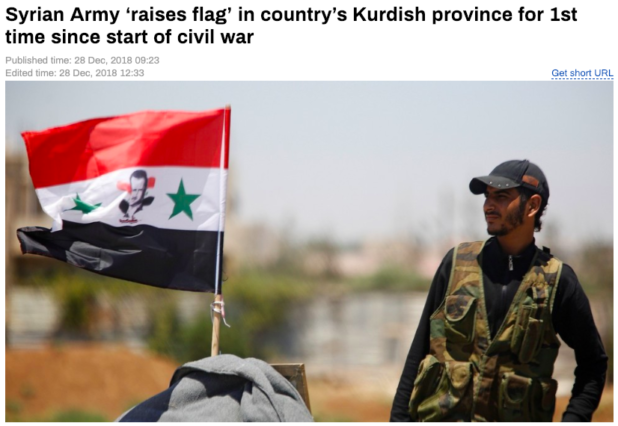Andrew Anglin
Daily Stormer
December 29, 2018
The story of the Syrian war is like the story of 15 ultra-paranoid autistic children being locked in a room together, plotting against one another as they shift their alliances between one another and try to individually out-maneuver everyone else in the room.
The Kurds were allied with the US and the US’s “moderate terrorists.” When the moderate terrorists were removed, Israel and the US stepped in to befriend the Kurds, who were by that point fighting Turkey, after Turkey invaded Syria in response to Kurdish terrorist activity on their side of the border.
The media then attacked Trump for pulling troops, saying that it was the US’s sovereign duty to protect the Kurds from NATO ally Turkey, while actually simply wanting the Kurds to continue to drive a wedge in the side of Assad.
Israel’s Justice Minister Ayelet Shaked said the US troop withdrawal from Syria is a wrong decision and hoped the international community would not allow Turkey to “massacre Kurds.” https://t.co/4rWVI7Aaoj
— Julie Lenarz (@MsJulieLenarz) December 25, 2018
However, just over a week after the announcement that US forces are withdrawing, the Kurds called up Assad – great nemesis of Israel – to return to Kurdish territory to protect them from Turkey.
American forces remain on the border of Turkey and Syria, preventing any action against this by Turkey. Furthermore, Turkish President Recep Erdogan wouldn’t want to take any action against the Syrian Army, due to his now relatively strong alliance with Assad ally Russia…
If you haven’t been following these events, and that all sounds confusing, don’t worry about it. It really is like the analogy of trying to watch a bunch fo autistic children plot against one another. No one can really figure it out.
Feeling betrayed by the United States, its Kurdish allies in Syria asked the Syrian government on Friday to protect them from possible attack by Turkey.
The request surprised some American officials and could help open the way for the forces of President Bashar al-Assad of Syria, backed by Russia and Iran, to start retaking the Kurdish-held part of the country near Turkey’s border.
That would be a big step toward Mr. Assad’s goal of reclaiming all of Syria, upended by almost eight years of war.
It was also the first sign that President Trump’s abrupt announcement last week that he was withdrawing American troops from Syria was not only shifting alliances in the conflict but directly benefiting Mr. Assad — a brutal autocrat once described by Mr. Trump as an “animal” responsible for chemical attacks and other atrocities.
Yeah, attacking Assad at the behest of the Jews was bound to come back and bite Trump.
But the level of confusion here is really too high for it to even matter. An alleged democracy-loving US ally that allegedly would die without our protection immediately allied with an alleged “brutal autocrat” minutes after we left.
American-backed Kurdish People’s Protection Units, or Y.P.G., said the Syrian government should send troops to the city of Manbij, near the Turkish border.
The request amounted to a United States ally calling on an enemy of the United States to protect it from another American ally, Turkey.
Now see, that could only follow logically if you have virtually no idea about the history of this country and the region in general.
If you have some idea about the region, it sounds retarded.
The Kurdish militias are regarded by Turkey as dangerous, autonomy-minded insurgents. The United States regards them as valuable partners in helping rout Islamic State extremists from Syria — the original purpose of the American military deployment four years ago.
The NYT has really begun appealing to the lowest common denominator with this stuff.
It’s just a practical matter, because there is nothing else they can really say. Even the Economist and other ostensibly intellectual publications have been running with narratives that are contingent on a mix of the total ignorance of the reader and a desire in the reader to simply believe authoritative publications, whatever they say.
I’m not myself a Middle East expert, but this is really basic stuff here that the New York Times is trying to smoosh down to the level of a children’s book.
Although the American troops in Syria number only about 2,000, they have been a deterrent to an assault on the Kurdish militias by the Turks. The American presence also discouraged Mr. Assad’s forces from sweeping into the area even as they retook major areas elsewhere from anti-government fighters, often with the support of Russia and Iran.
American soldiers are human shields, because no one wants to kill an American soldier. For obvious reasons. The US is able to embed a few troops into any area, then announce it, and no one will attack that area for fear of killing an American soldier.
With the request for help on Friday, the Kurds invited Mr. Assad into at least some of those areas that he had coveted.
Some American officials were taken aback by the Kurdish announcement, voicing frustration and anger to their Kurdish counterparts, according to a senior American official. There was no consultation or coordination, the official said.
While the United States understands the Kurdish motivation to open discussions with the Assad government, the official said, the Kurdish position did not necessarily reflect views of Arab members of the Kurdish-Arab coalition fighting the Islamic State in eastern Syria, and said it amounted to a unilateral bargaining gambit.
The Kurdish-led militias control about one-quarter of Syria’s territory, including valuable agricultural land and oil reserves in the north and east of the country.
Kurdish control is opposed not only by the Turks, but also by the government of Mr. Assad as well as its Russian and Iranian backers, who want the territory to fall back under the control of Damascus.
Mr. Trump’s surprise announcement that he would pull American troops had raised fears of a scramble by competing forces to exploit the resulting vacuum.
Through their alliance with the United States, Syria’s Kurds gained unprecedented military and political power during the war. As Islamic State fighters were pushed back, the Kurds often filled the political gap left behind, establishing councils to run local affairs.
But aware that the United States could eventually withdraw, they also began talks with the Syrian government about reconciling.
Okay, so.
The rest of that NYT article just devolves into gibberish quotes from the Atlantic Council about how this all has something to do with ISIS, because ISIS is both the boogieman and a creation of the West, which is used as the lever to make this all seem a lot more complicated than it actually is.
The NYT does include this handy map from IHS Markit:
Which looks to me to be more or less totally accurate.
ISIS controls almost no territory at all, and the territory they do control is only held by the use of the civilian population of these areas as human shields – something which they are able to do because of the US policy of using attacks on terrorists as “humanitarian crises.”
As if the US has never, ever, in any of its wars, accidentally killed civilians.
What is actually happening is that the entirety of Syria is going back to business as usual, as foreign interference is disappearing.
The situation between the Syrian Kurds and the Assad government was for a very long time that Assad gave them a degree of autonomy, while protecting them from Turkey, who would wipe them out due to the fact that there are also Kurds in Turkey, who are generally terroristic, and use Northern Syria as a base of operations.
The NYT is correct in stating that by stationing themselves on the Syria-Turkey border, US troops are preventing Turkey from invading and attacking the Kurds who are now allied with Assad to stand against a Turkish invasion.
However, the previous deal between Assad and Turkey also involved Assad keeping the Kurds in check, to whatever degree, and not allowing them to use Northern Syria as a full-on terrorist training camp to attack the Turks.
And basically, what we are witnessing is all of those formerly stable power dynamics reemerging, after they were thrown into chaos by:
- The rise of ISIS
- US and CIA intervention
- Jewish attacks
Free from any insane act by Israel, or a change of mind by Trump, this is all going to go back to business as usual.
And Syrian troops in Kurdistan are going to make it hard for Israel to continue to exert influence there. They can keep bombing Damascus, but that risks making Putin very angry, something that Netanyahu has generally tried to avoid.
All in all, this situation is looking better than anyone could have expected.
The alternative option of Turkey and Assad allying against the Kurds would have created a whole lot of violence and death, which the Jewish media could have used as leverage. But now all that is needed is for Assad and Turkey to come to an agreement about securing the border so as to not allow Kurdish terrorists to cross it.
Who Knows?
The Kurds were the last card in the Israeli deck, and they’ve now just allied with Assad, who was the whole reason for starting this war, given that Assad is viewed as a threat to Israel, in large part due to his alliance with Iran.
If the war ends totally, however – as it appears it is going to, short of some weird and unforeseen event – Iran can leave.
So then what?
No idea.
The Christmas Day bombing by Israel demonstrates that they’re willing to do whatever to keep this war going, but with the US leaving, their options are very limited.
 Daily Stormer The Most Censored Publication in History
Daily Stormer The Most Censored Publication in History





